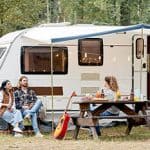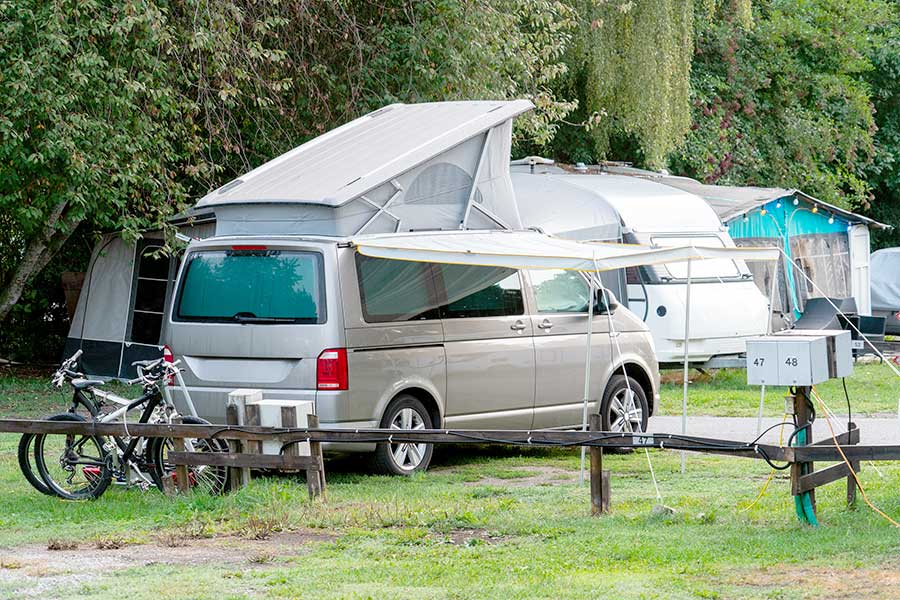
When planning your family vacation, consider van camping rather than staying at a hotel. The memories and rewards you will get from van camping will be something that you and your family will treasure for years.
Van camping is better than staying in hotels because it is more convenient as you have the comforts of home right along with you. You can travel at your own pace and prepare meals anytime you want, and the natural surroundings at your campsite allow you to relax and connect with nature.
However, the benefits don’t just stop here. There are plenty of more reasons why van camping is better than sleeping in a hotel room, continue reading to discover the benefits that often make it a much better choice.
1. Travel at Your Own Pace
A few of the primary purposes of traveling, camping, road trips, or whatever you want to call it is to get away from the stress of work, from the hassles of home, see new places, or to get a break from the humdrum of everyday life.
The last thing that you want or need while on vacation is the pressure of schedules and the stress of having to be at a hotel at a specific time on a particular day. To me, freedom is one of the most significant benefits of van camping.
Van camping allows you to leisurely travel at your own pace, make side trips to attractions that you didn’t have in your plans, spend a whole day someplace you weren’t planning to. It gives you the liberty to make spur of the moment decisions and not have to check-in at a hotel at a specific time and if you fail to arrive, leaving you with the possibility of a lost deposit or having to pay for the room anyway.
When van camping, your room is always with you, just find a campground, and stop for the night. There are plenty of places you can pull off the road and sleep for free, too.
Eat When You’re Hungry
I don’t know about how hungry you get, but when I am van camping, it seems like my appetite kicks into overdrive, and I am hungry all the time. When you are traveling in a van, you can carry your food right with you, and you don’t have to drive another hour to get to a restaurant to satisfy those hunger pangs.
Find a park with a picnic table or a roadside rest and prepare a fast, delicious meal when you want.
Again the ability to do this allows you to go your own pace as you explore new areas. If you are van camping, sure you might choose to eat out once in a while, but you still have the choice to make “homecooked” meals.
Cooking on the go might even save you some money. The price of a mac & cheese dinner cooked at home versus in a restaurant is:
-
- Home Cooked: $1.33
- Restaurant: $20.78
(Source: Forbes)
Your van might have a built-in kitchen, or maybe you are cooking on a gas grill; either way, it is undeniable that eating a homecooked, or campsite cooked meal is most likely less expensive.
Enjoy Activities as You Travel
When you have been traveling for 3 or 4 hours straight, you probably are ready to stretch your legs. Park your van and get out and explore, remember there is no time table that you have to meet.
Some hotels have a pool or gym available for guests, but that is it. In the outdoors, you can explore and play for free. You can go for a hike, birdwatch, sketch wildflowers, or work on your photography skills. You’re not going to find that perfect sunset-over-the-mountains background for your Instagram photo in a hotel room.
Take a Nap When You Want To
Another great benefit of traveling at your own pace is that you can take a nap when you want to because you have the luxury of having your bed right with you. It seems like in the afternoon, after driving most of the day or hiking, I get a little tired and sleepy, and being able to lay down and take a 15-minute power nap is the refresher that I need to be able to go for 5 or 6 more hours.
2. You Can Eat Healthy, Homecooked Food
Eating out can lose its appeal if you are doing it for every meal. Plus, restaurant food is often less healthy than a meal you can prepare yourself. Another benefit of van camping is that you can grab a bite to eat at a local eatery or make food yourself. You have more options for what you can eat than deciding between a granola bar or overpriced pancakes.
Being able to cook your food is a bonus if you or your travel partners have food restrictions. Trying to get a delicious meal at a restaurant when you are vegan and gluten intolerant can be nearly impossible. When you can bring your food, you get to be full and satisfied.
Whether you have a mini kitchen in the van or hauling a cooler and camp stove, cooking can be fun. Add in views of an azure lake and the soundtrack of birds twittering, and you just might find yourself wondering if you are in heaven.
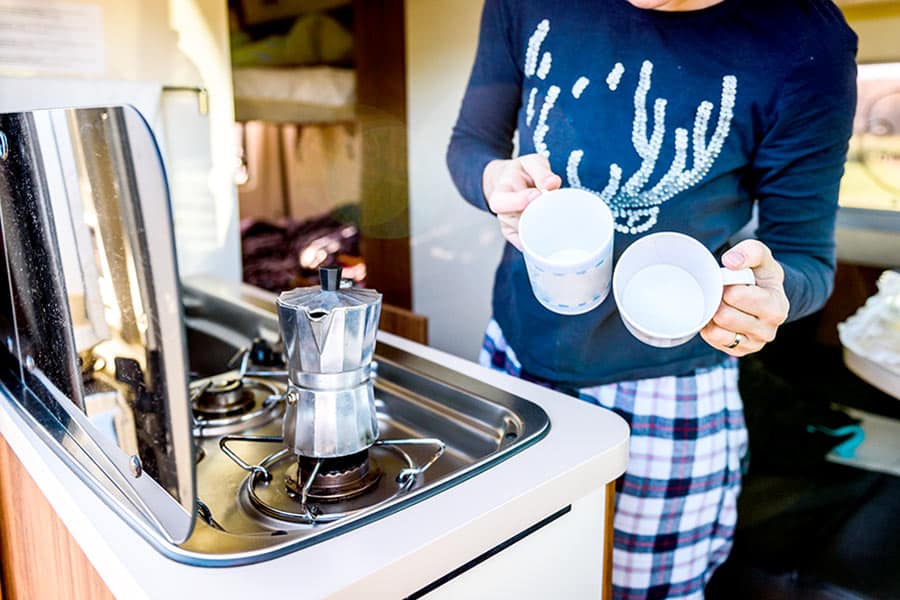
If you are hesitant to cook out of a van, here are a few tips and tricks to calm your doubts and get you pumped to make a delicious meal:
Shopping
What you buy and how much you get is crucial when traveling and cooking in a van. You have limited space, so making smart purchases is a goal. Some things to think about are:
- How much food you need. Even though buying in bulk can be cheaper and more environmentally friendly, you have limited space, so only buy what you need. You can always stop in the next town to restock.
- Keep it simple. Gourmet three-course dinners and van camping don’t go hand in hand. Cooking with simple ingredients doesn’t have to be boring, though. When you are outside, everything tastes better anyway.
- Keep it dense. Nutrient-dense foods mean more food in less space. Foods such as canned tuna, eggs, brown rice, beans, fruits, and vegetables are easy to store and cook.
- Plan ahead. Before you go shopping, plan a couple of meals and check to see what ingredients you already have. Think about doubling a recipe so you can have leftovers.
Storage
Once you purchase your food, it is time to play storage Tetris. With a little storage creativity, you might be surprised to see how much food you can fit into a van. A couple of tips are:
- Use storage containers. Foods stored in their original packages can take up extra room. Find some storage containers that you can transfer food into. Containers will also help keep your crackers from turning to crumbs.
- Think about placement. Items you use less frequently, you can store under or behind everyday things.
Gadgets
Deciding what kitchen gadgets and cookware to bring can be tricky. Think about what you need for cooking versus what is convenient. It is better to start with less; you can always buy things along the way if you desperately need them. For a week-long excursion, you might only use:
- 4 Person Dinnerware Set
- Pot
- Frying pan
- Sharp knife
- Spatula
- Mixing spoon
Recipes
The internet is overflowing with camping recipes. For van camping, a good recipe uses simple ingredients and minimal cookware. Once you have your food cooked, you get to sit back and enjoy the view. You certainly won’t miss the racket of a crowded restaurant.
3. There’s More Convenience
There are some trips where you might not have paid attention to the hotel’s location when you booked it at midnight six months ago and are now realizing you are pretty far away from all the happenings. Your options now are to work out those leg muscles, rent a car, or hope there is a ridesharing service available.
You can forget all that stress when you choose to go van camping. You can head into town for shopping, head to the lake for the afternoon, or just go anywhere else.
If you stay at a hotel with the intent of visiting a state or national park, you have to commute. Forget something in your room, and you’re just out of luck. With a van, you can spend your whole trip right there in the park. An afternoon siesta, a yummy snack, or a change of clothes are all within reach.
Besides, you won’t have to haul all of your gear into the hotel for the night and then pack up your vehicle each morning to continue to your next destination.
4. There’s More Flexibility
Who doesn’t love having the flexibility and freedom to come and go as they please? You don’t have to deal with last-minute cancellation fees or urgently finding a hotel room you can afford. If at 2 a.m. you decide you want to pack up and head to the coast, go for it. When you arrive, if you decide it’s not to your liking, nothing stands in your way of heading in a new direction.
If you prefer to find a spot, park the van, and settle in for a week, staying within walking distance of your vehicle, this is fine as well, but in either case, you will always have the flexibility to venture around. With an abundance of resources available, it is easy to find a place to spend a single night or a whole month, too, and achieve that same flexibility.
Besides, with van camping, you can alter your trip’s itinerary at any time. There is no reason to be stuck seeing the same thing every day of your vacation. Every day can be a new adventure.
5. You Can Bring Along Furry Companions
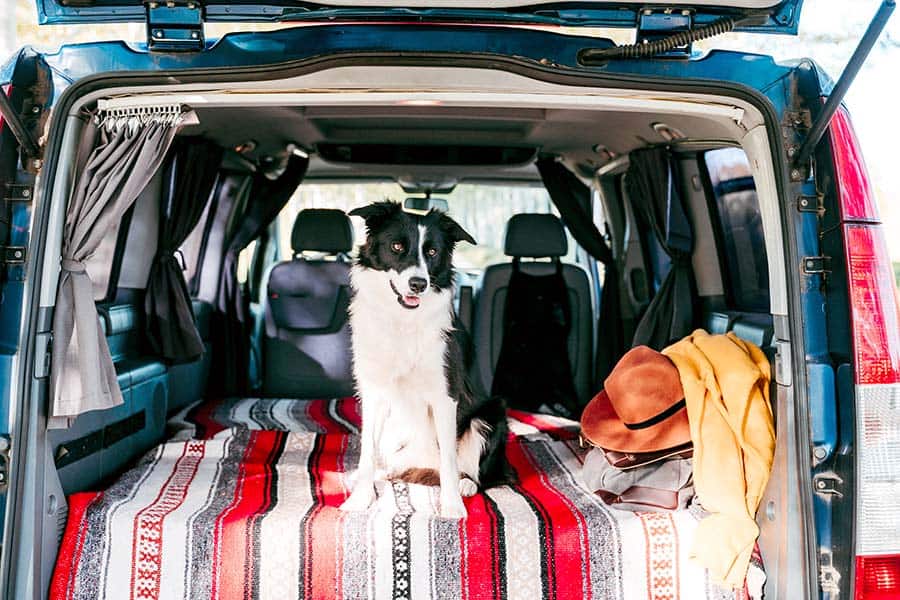
If you have a retriever, terrier, or even a Maine coon, there is no reason to leave them at home when you are out having fun. Traveling with pets on airplanes is stressful for everyone involved, and finding a pet-friendly hotel can be a nightmare when you arrive to find your cuddly pitbull isn’t welcome.
There is no need to say good-bye to those sad puppy eyes as you leave your pal behind at home with camping.
When you opt to go van camping, bringing your furry friends along is no sweat, but it is essential to make sure your four-legged travel buddy is having fun too. Here are a few things to keep in mind:
The Ride
Some dogs love car rides, and that makes van camping just that much easier. If your pet is more hesitant about hitting the road, go for short practice rides to help them feel comfortable. Use treat rewards when they get in the vehicle and have a designated spot for them to sit.
The Temperature
You might not mind the 110° F temperature in Arizona, but your fur-covered buddy might. When you drive, blasting the air conditioning can keep everyone cool, but think about when you stop. As reported by the American Veterinary Medical Association, a vehicle parked for an hour can be more than 40 degrees hotter than the temperature outside.
Conversely, your husky might be in doggie heaven while romping in the mountain snow, but how is that shivering chihuahua feeling? When planning your trip, keep in mind what the air and pavement temperature is going to be along the way and at your destination. You might need to alter your plans for the safety of your pet.
The Supplies
You might find it useful to create a pet packing list to make sure you bring what you need. If your comrade takes medication, be sure you have enough for the whole trip. Some essential supplies to bring are:
- Collar with ID Tag, Harness, and Leash
- Car Harness or Crate
- Treats and Toys
- Food and Water
- Bowls
- Bark Box Dog Bed
The Destination
Wherever you choose to set up camp, be sure to know the rules. State and national parks might require your pet to be on a specific length leash or not allow pets.
Other Posts of Interest
- The Cost Of Converting A Sprinter Van Explained
- Maximizing Space In A Camper Van – 8 Tips You Need To Know
- Is a Pop-Top Worth It?
- Do You Need An Axe For Camping?
6. The Comforts of Home Are Just at Your Fingertips
Whether you are a homebody or an adventurous soul, it is always nice to have some comforts of home when traveling. In a hotel, everything is uniform, and you are just out of luck if those pillows hurt your neck.
Van camping, on the other hand, allows you to bring the comforts of home with you. If you own your van, then you can personalize it all you like. Even if you are renting a van, you can still bring your home with you.
When you opt to stay in a hotel, what you bring is usually limited to a suitcase or two. You probably had to leave out your favorite shampoo, that second novel, and you certainly didn’t bring those comfortable new sheets. With van camping, you can bring all that and more. Sure, the entire contents of your 2,000 square foot home aren’t going to fit in a van, but you can definitely bring your favorite coffee mug, a fishing pole, and your favorite comforter.
7. You Can Remain Undisturbed
Yes, you will need to make your bed, but that trumps forgetting to put out the “Do Not Disturb” sign and having a maid walk in at an inopportune time. You can lock the doors to your van, close curtains you set up yourself, and not have a worry in the world.
On the other hand, hotels come with strange sounds. No one wants to listen to endless thudding above you or the sound of machinegun fire from the adjacent room’s TV. If you can put up with the sound of the breeze rustling the trees and a singing sparrow, then why even consider booking a hotel room?
8. You Can Slow Down and Reconnect
Life is busy; you can live in a house with people and barely get a chance to ask how their day is going. Camping is the perfect way to take a break from your hectic schedule and enjoy spending time with friends and family.
If you have kids, camping is a great way to spend quality time with them before they are too old. They can learn new skills or be inspired to become one with the outdoors. Stepping away from the rush of the city opens a whole new world of opportunities.
When you all sit together in the great outdoors, sipping on refreshing lemonade, you reconnect with each other. If you are adventuring on your own, the clean air and peace will help you get in touch with yourself.
9. Ability to Socialize
If you like to meet new people and to socialize, then camping is far superior to staying in a hotel. Hotels are about privacy, and people tend to stick to their groups. Plus, with the abundance of WI-FI and technology, people in hotels end up walking around with their eyes glued to their phones.
While camping, you have a chance to make friends. There are a million reasons to meet your camping neighbors; you run out of bug spray, you want to see some new gear, you brought too many s’ more fixings—the list goes on. Your eyes and brain will celebrate when they can interact with another human in person instead of through a screen.
Don’t worry, though; if you are more of an introvert and enjoy some solitude, there is no pressure to become besties with anyone but the trees.
10. Plenty of Campfire Activities
A campfire should be reason enough to drive past the hotel and into the woods. The smell of smoke and the flickering flames are mesmerizing and relaxing. The hot dogs you roast or the marshmallows you toast are infinitely better tasting than what you order in a restaurant. Sure, a hotel might have a fireplace in the lobby, but it is far from the same experience.
Ultimately, memories are made around a campfire, not on the edge of a hotel bed while watching reruns. You can just let go and be goofy. For additional fun, you can also play a few games with your camping party; scavenger hunts, cornhole, bocce ball are just some of the fun games you can enjoy together.
11. Be Surrounded by Nature
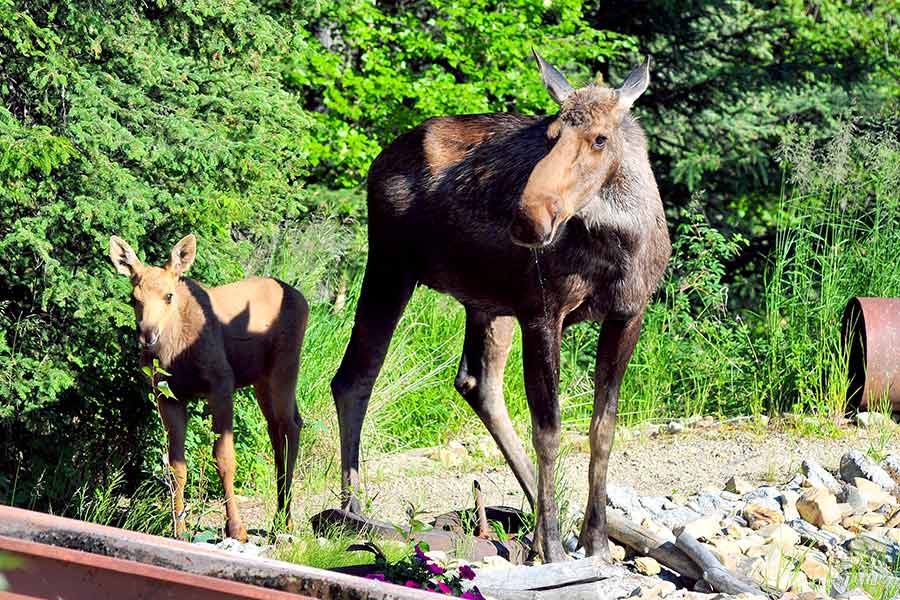
One of the biggest benefits of van camping is merely being in nature. You get to roam the land finding that place that just feels right for a stay. Mountains, forests, desert, or coast—it’s all at your fingertips.
Instead of throwing the curtains open and staring into a grungy alley and walking through the same lobby every day, imagine sliding the van door open and reveling in the morning sun’s glow, breathing in fresh air spiced with the scent of pine trees. At night, you can lay back and stare into the beautiful and vast starry night.
Sure, in a hotel, you can watch Animal Planet or swim in the pool, but that doesn’t compare to watching a knobby-kneed moose follow its mother across the road or slipping into a hot spring after a long day of hiking.
There are also some health benefits of being in nature; research shows that spending time outdoors improves your physical, mental, and emotional health. A collection of research and articles on the health benefits of nature are available from the American Society of Landscape Architects.
Where to Stay when Van Camping
There are camping spots to fit any budget and to satisfy any soul. Whether you are looking for one destination or want to be somewhere new every day, you can easily find the perfect spot to park your van.
Places to Camp
There are a few different types of sites you can camp with a van:
Public Campgrounds: Public campgrounds are very abundant and range in price. The most common places to find these campgrounds are:
- Local, State, or National Parks
- State or National Forest/Grassland
- Bureau of Land Management Sites
Private Campgrounds: These are usually more expensive than public campgrounds but can come with unique amenities.
Boondocking Sites: The term boondocking refers to undeveloped camping areas. Often on public land, these are designated areas for camping with minimal or no amenities but are free of charge. Read our post about boondocking for more information.
City Camping: Some places like casinos or large retailers such as Walmart or Cabela’s will let vehicles spend a night in the parking lot. These are for single night stays only, and be sure to call ahead to see if they allow overnight parking.
Many campgrounds do require reservations, and some need to be reserved months in advance. If a campground doesn’t fill up, you can usually get a spot first-come, first-served.
Finding a Spot
Just like finding a hotel, there are dozens of sites available. Unlike hotel sites, though, they are not in your face about having the best deal. Some popular websites for finding places to camp are:
- Reserve America: campground reservations and guides
- Campendium: information and review on all types of campsites
- Hipcamp: a guide to public and private campgrounds
Final Van Camping Tips
If you have never van camped before, it may seem intimidating at first. As you become a more seasoned van camper, you will figure out ways to make it easier and even more fun. Whether you plan on spending long periods in your van or merely going on weekend excursions, here are some tips you will be glad to know:
- Bring the right clothes for the weather. Arriving at your destination and discovering the shorts and t-shirts you packed aren’t going to keep you dry during summer rainstorms is not fun. Check what the weather will be at your destination and along the way so you can optimize your comfort.
- Bring an emergency kit. Having supplies for an emergency can be the difference between a great story and a miserable experience. The National Safety Council provides a list of emergency supplies you should keep in your vehicle. Here is an excellent car roadside emergency kit with jumper cables, portable air compressor, and a lot more.
- Eat healthily. As tempting as fast food may sound when you’ve been on the highway for hours, do your best to pass it by. Eating junk food on the road is not a good combo for your health. Keep some healthy snacks within reach to nibble between meals.
- Keep some wet wipes handy. Wet wipes can be used for sticky fingers or taking a waterless bath.
- Download some good audiobooks or podcasts. Listening to music is great, but if you are on a long trip, you might want to mix it up.
Final Thoughts
In conclusion, although hotels are usually the go-to option for lodging near remote sites, there is nothing quite like van camping. From basking in nature to being more convenient and flexible, van camping offers plenty of benefits over hotels that are just too good to pass up.
So, the next time you plan a getaway, try to skip the hotel website and opt for van camping instead; you might find yourself discovering a new hobby or lifestyle that you and your camping partners can enjoy in the great outdoors for many years to come.






